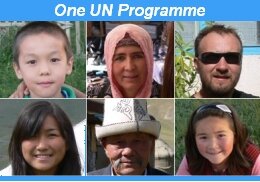| Shift system of pre-school education – addressing challenge of access to all children in Kyrgyzstan especially poor |
|
|
| Categories: (Other Documents | Document Database | UN Agencies | UNICEF) |
|
In Kyrgyzstan, a post-Soviet country, International Woman’s Day continues to be celebrated. On this day the role of women in the development of society and as the keystones of families is highlighted, as is their role as guardian of the hearth at home and of peace in the state. In addition, prominence is given to the contribution of women to particularly important state programmes. This year, UNICEF in Kyrgyzstan received a pleasant gift. Chinara Akhmedova, project partner of the UNICEF programme for early childhood development in Batken Province, received a state award for services to the country from the hands of the President of the country. By this award, the Government highlighted not only the work of Ms. Akhmedova to promote early childhood development, but also the importance of the sector itself.The benefits of investing in early childhood development and the consequences of ignoring this sector of society Investing in early childhood development leads to long term social change and sustainable realisation of children’s rights. Experts state that quality care, protection and development of children in their early lives are key factors that reduce mortality, disease and trauma in children, and mitigate the effects of poverty. At the same time, these factors facilitate the healthy growth of children, and improve their self esteem and aptitude to learn. These factors, in turn, play an important role in preparation of children for school, and help to develop their capabilities for further studies. Investment in early childhood development leads to effective school programmes and increases the potential of children to make a contribution as economic actors and citizens in the future. In addition, according to international and national research, investment in early childhood development is extremely profitable. Limited access to preschool education since the beginning of the 1990s has already had a negative impact on the success of schoolchildren. Monitoring of Learning Achievements carried out recently by UNESCO in partnership with UNICEF showed that about 40 percent of primary school pupils do not have the necessary level of literacy and numeracy for their age group. These indicators contrast sharply with the level of literacy in Soviet times and put into question the progress of pupils, the effectiveness of the education system and as a consequence, prospects for economic development of the country. The National Assessment carried out by the Ministry of Education and Science of the Kyrgyz Republic in 2007 showed that more than 60 percent of the assessed fourth grade schoolchildren had knowledge levels lower than the basic level. This means that more than 60 percent of primary school pupils do not have the skills and knowledge necessary for successful further study. In connection with the lack of preschool programmes, or difficulty in accessing them, most children are not ready for school when they start, both in terms of social adaptation and in basic knowledge and skills. This negatively affects the progress of children and slows the process of education. As a result, many of the slower pupils in primary school stop attending at all, particularly in poor districts. Solving the problem: transition to a shift system Batken Province is the most distant from the capital, with the highest rates of poverty and unemployment (the level of poverty in Batken at the end of 2007 was 59.1 percent). Until recently, only 2 percent of children in the Province could attend preschool institutions. Now, thanks to donor interventions, this indicator has risen to 6 percent, but this is still a very low figure. It is for this reason that since 2005 Batken Province has been a pilot region for UNICEF’s early childhood development programme. Even in the better-off Soviet times the number of children attending preschool institutions in Kyrgyzstan did not exceed 33 percent. This was because there were not enough kindergartens, and so there were always waiting lists for places in preschool institutions. In the current economic climate in Kyrgyzstan, particularly in the context of the global crisis, it is unrealistic to assume that the state can in the short term even bring back the number of preschool institutions that existed before the breakdown of Soviet infrastructure (the number of institutions fell from 1600 in 1991 to 400 in 2001). Therefore UNICEF proposes that the country makes a gradual transition to a shift model for preschool institutions. This model is much cheaper, as children do not sleep in kindergartens and attend not for 9 hours, as has been usual practice in the country, but rather for just a few hours. This significantly simplifies maintenance of the kindergarten, but at the same time preserves the important component of preschool education - teachers work with the children during structured educational and playing activities and the children acquire socialisation skills while interacting with their peers. Currently, out of 31 preschool institutions that have opened in the target villages of Batken Oblast with the support of UNICEF, 12 are already working with the shift model. As a result, for example, in the remote village of Kyzylbel 82 percent of preschool age children are already attending the Barchyn Children’s Educational Centre, where teachers apply the Waldorf system and use innovative methods to work with young children. International studies show that children who attend preschool institutions for the whole day and children who attend such institutions for a few hours per day develop at the same speed. That is, the significance is not the intensiveness, but the duration and quality of preschooling. “In order that more children can attend preschool institutions, the most promising approach today and in today’s conditions is the transition to a shift approach to the work of these institutions,” says Chinara Akhmedova, the tireless UNICEF’s project partner in Batken. “And the most important thing,” she says, “is that thanks to the introduction of this system, the doors of preschool institutions have been thrown open for the most vulnerable and poorest families. The education programme has to be flexible, so it can accommodate the need of real children from real communities.” Olga Grebennikova |





















